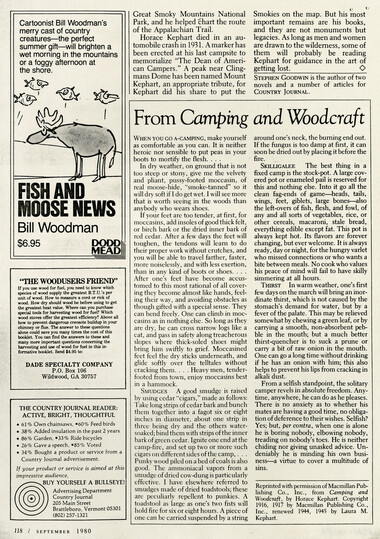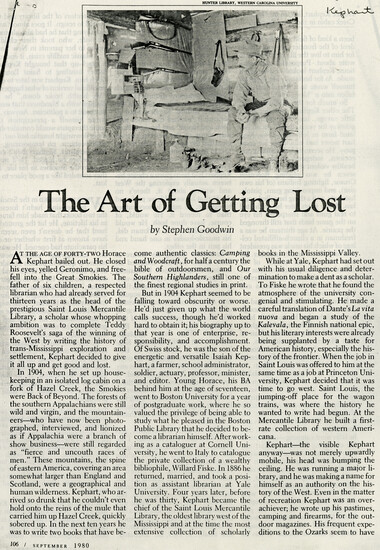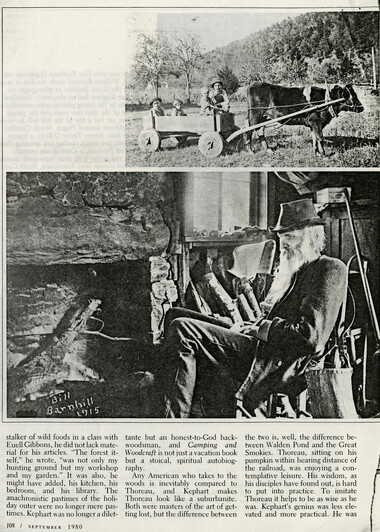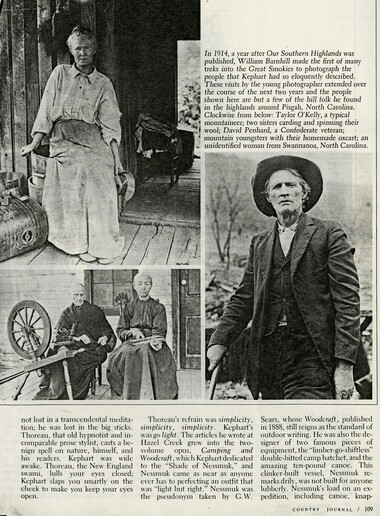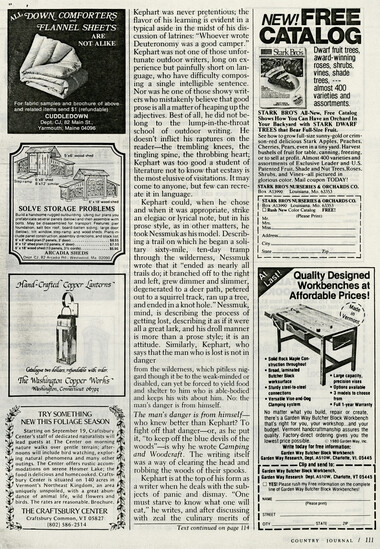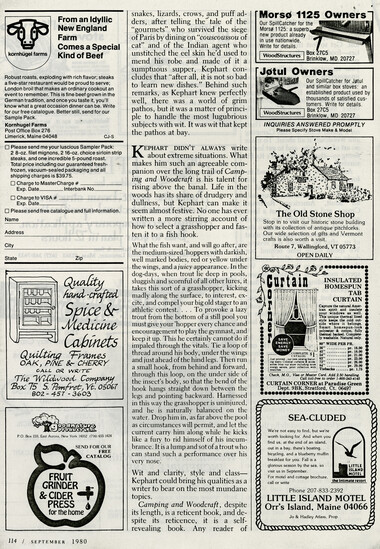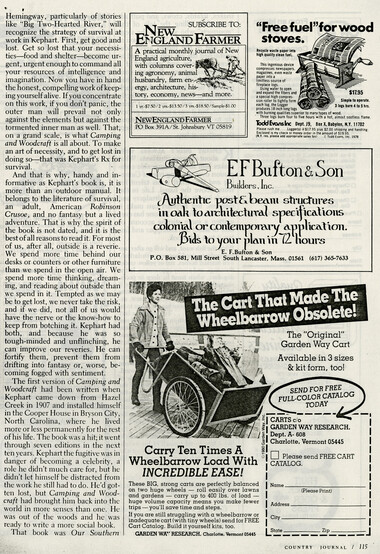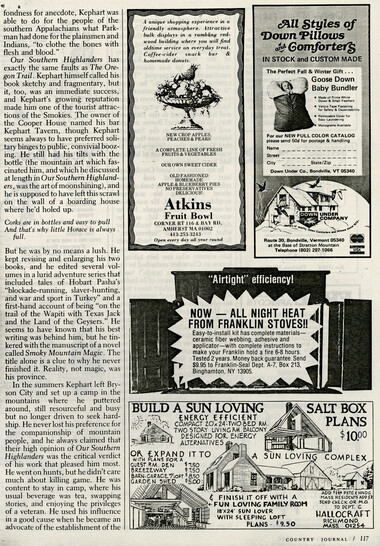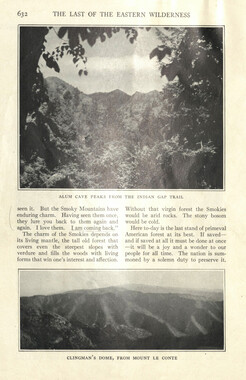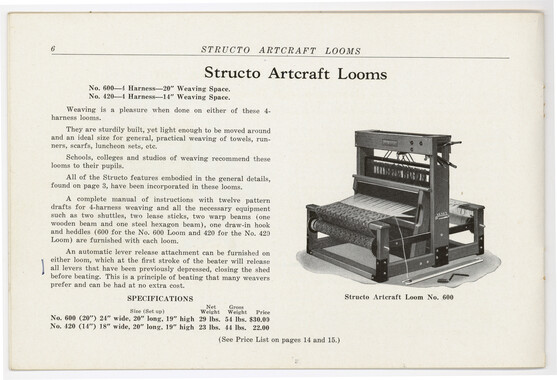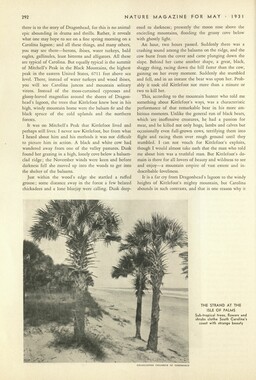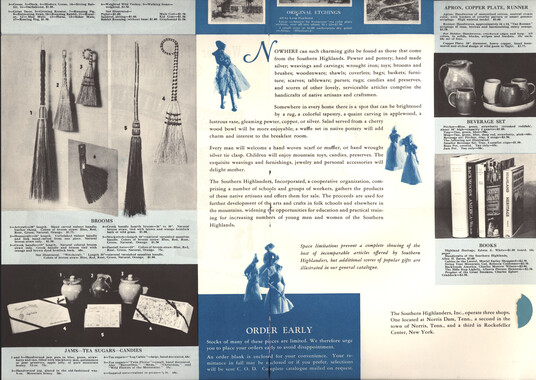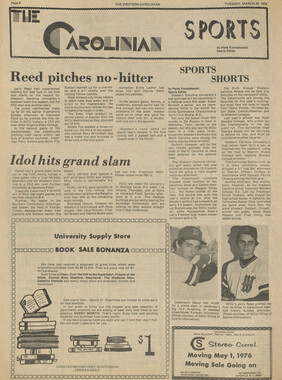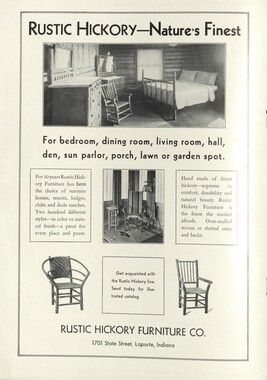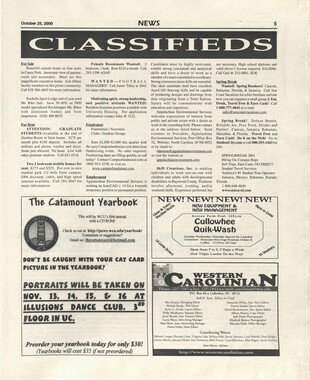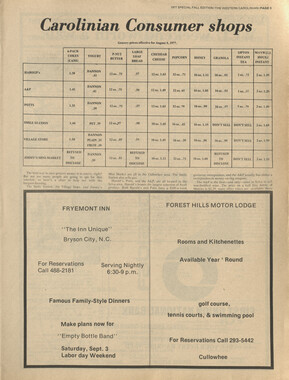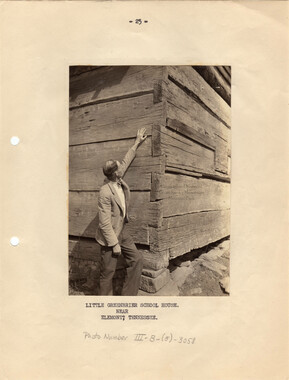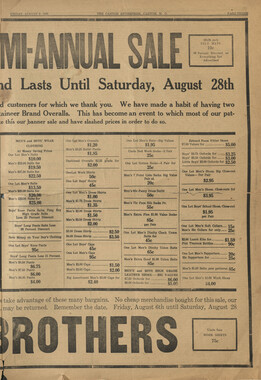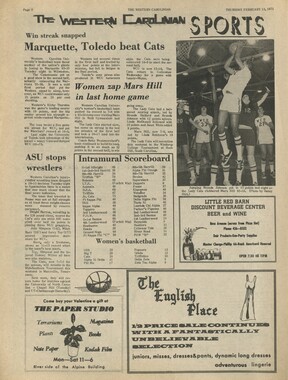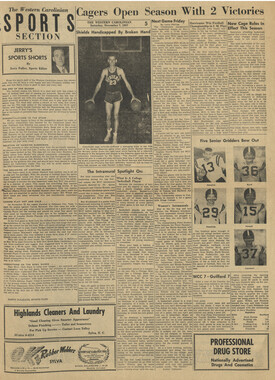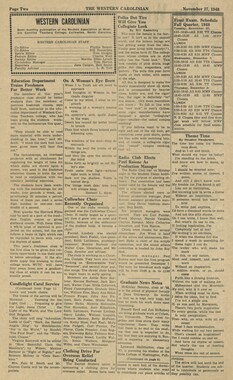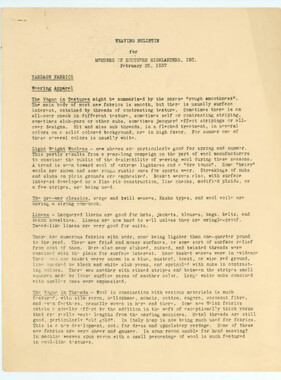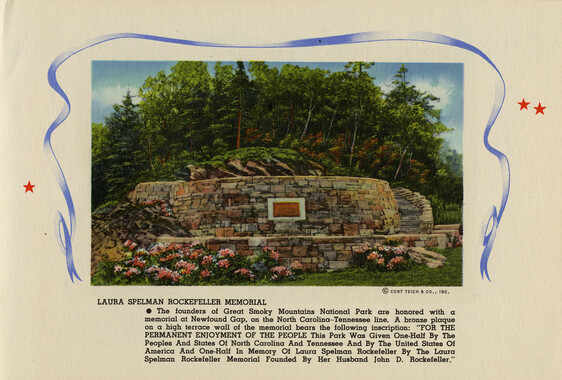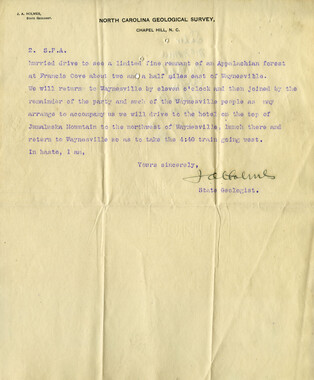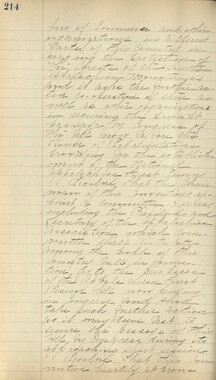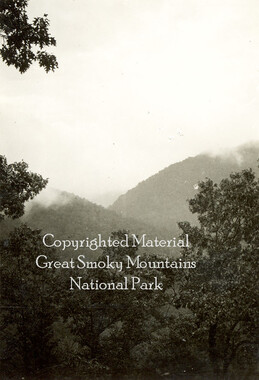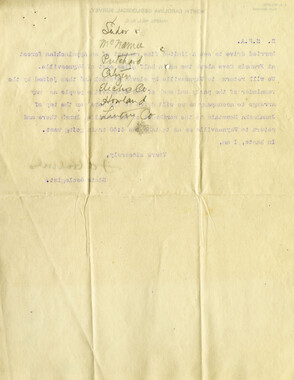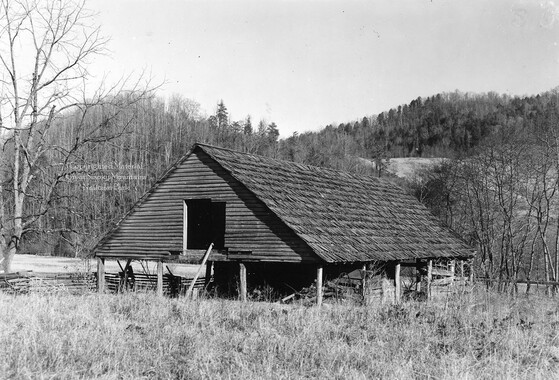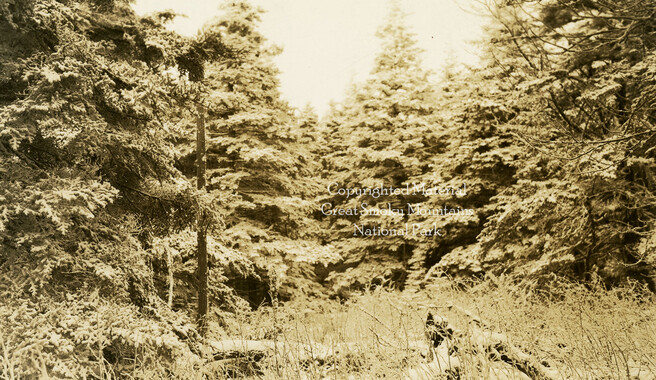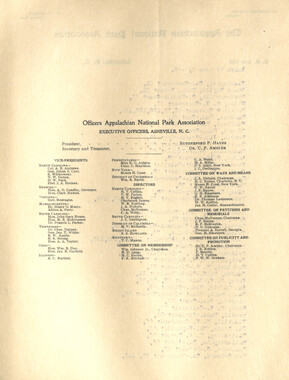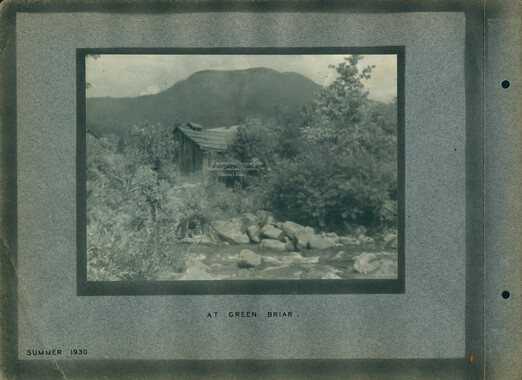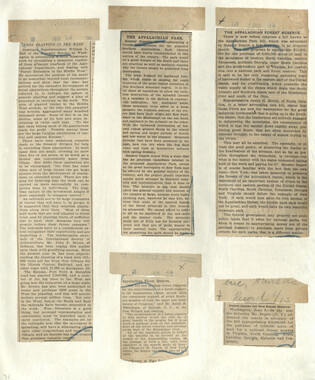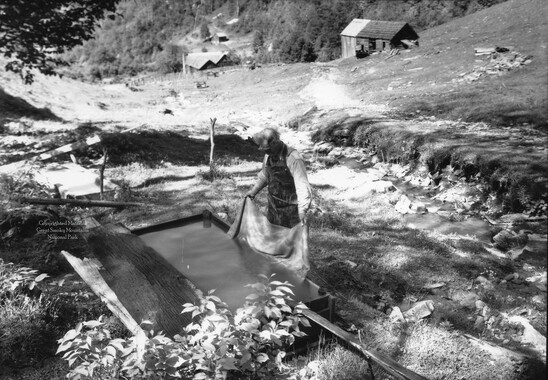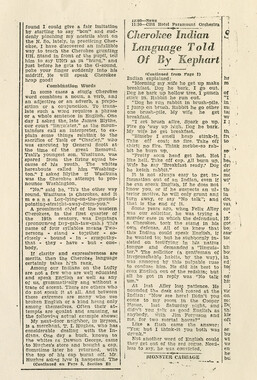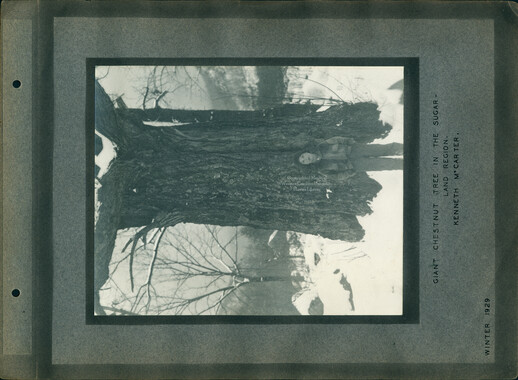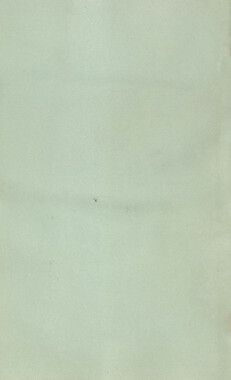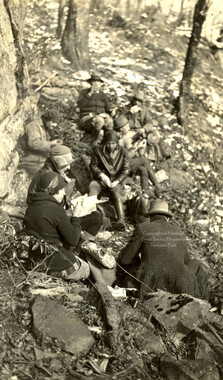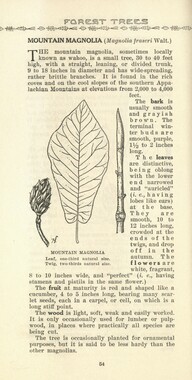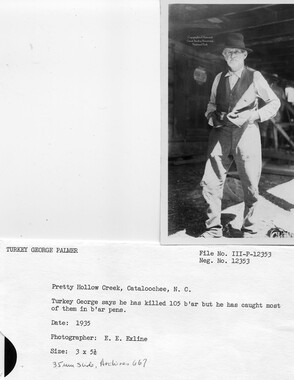Western Carolina University (20)
View all
- Canton Champion Fibre Company (2308)
- Cherokee Traditions (293)
- Civil War in Southern Appalachia (165)
- Craft Revival (1942)
- Great Smoky Mountains - A Park for America (2767)
- Highlights from Western Carolina University (430)
- Horace Kephart (941)
- Journeys Through Jackson (154)
- LGBTQIA+ Archive of Jackson County (24)
- Oral Histories of Western North Carolina (314)
- Picturing Appalachia (6772)
- Stories of Mountain Folk (413)
- Travel Western North Carolina (160)
- Western Carolina University Fine Art Museum Vitreograph Collection (129)
- Western Carolina University Herbarium (92)
- Western Carolina University: Making Memories (708)
- Western Carolina University Publications (2283)
- Western Carolina University Restricted Electronic Theses and Dissertations (146)
- Western North Carolina Regional Maps (71)
- World War II in Southern Appalachia (131)
University of North Carolina Asheville (6)
View all
- Appalachian National Park Association (53)
- Berry, Walter (76)
- Champion Fibre Company (5)
- Fromer, Irving Rhodes, 1913-1994 (70)
- Grant, George Alexander, 1891-1964 (96)
- Kephart, Horace, 1862-1931 (23)
- Masa, George, 1881-1933 (17)
- North Carolina Park Commission (105)
- Roth, Albert, 1890-1974 (142)
- Schenck, Carl Alwin, 1868-1955 (1)
- Stearns, I. K. (2)
- Thompson, James Edward, 1880-1976 (45)
- Weaver, Zebulon, 1872-1948 (55)
- Wilburn, Hiram Coleman, 1880-1967 (72)
- Allanstand Cottage Industries (0)
- Bennett, Kelly, 1890-1974 (0)
- Brasstown Carvers (0)
- Cain, Doreyl Ammons (0)
- Carver, George Washington, 1864?-1943 (0)
- Cathey, Joseph, 1803-1874 (0)
- Champion Paper and Fibre Company (0)
- Cherokee Indian Fair Association (0)
- Cherokee Language Program (0)
- Crittenden, Lorraine (0)
- Crowe, Amanda (0)
- Edmonston, Thomas Benton, 1842-1907 (0)
- Ensley, A. L. (Abraham Lincoln), 1865-1948 (0)
- George Butz (BFS 1907) (0)
- Goodrich, Frances Louisa (0)
- Heard, Marian Gladys (0)
- Kephart, Calvin, 1883-1969 (0)
- Kephart, Laura, 1862-1954 (0)
- Laney, Gideon Thomas, 1889-1976 (0)
- McElhinney, William Julian, 1896-1953 (0)
- Niggli, Josephina, 1910-1983 (0)
- Osborne, Kezia Stradley (0)
- Owens, Samuel Robert, 1918-1995 (0)
- Penland Weavers and Potters (0)
- Rhodes, Judy (0)
- Roberts, Vivienne (0)
- Sherrill's Photography Studio (0)
- Smith, Edward Clark (0)
- Southern Highland Handicraft Guild (0)
- Southern Highlanders, Inc. (0)
- Stalcup, Jesse Bryson (0)
- United States. Indian Arts and Crafts Board (0)
- USFS (0)
- Vance, Zebulon Baird, 1830-1894 (0)
- Western Carolina College (0)
- Western Carolina Teachers College (0)
- Western Carolina University (0)
- Western Carolina University. Mountain Heritage Center (0)
- Whitman, Walt, 1819-1892 (0)
- Williams, Isadora (0)
- 1810s (1)
- 1840s (1)
- 1850s (2)
- 1860s (3)
- 1870s (4)
- 1880s (7)
- 1890s (64)
- 1900s (294)
- 1910s (227)
- 1920s (461)
- 1930s (1585)
- 1940s (82)
- 1950s (15)
- 1960s (13)
- 1970s (47)
- 1980s (14)
- 1990s (17)
- 2000s (31)
- 2010s (1)
- 1600s (0)
- 1700s (0)
- 1800s (0)
- 1820s (0)
- 1830s (0)
- 2020s (0)
- Appalachian Region, Southern (80)
- Asheville (N.C.) (1)
- Avery County (N.C.) (6)
- Blount County (Tenn.) (159)
- Buncombe County (N.C.) (204)
- Cherokee County (N.C.) (10)
- Clay County (N.C.) (3)
- Graham County (N.C.) (108)
- Great Smoky Mountains National Park (N.C. and Tenn.) (416)
- Haywood County (N.C.) (263)
- Henderson County (N.C.) (13)
- Jackson County (N.C.) (58)
- Knox County (Tenn.) (21)
- Knoxville (Tenn.) (11)
- Lake Santeetlah (N.C.) (10)
- Macon County (N.C.) (25)
- Madison County (N.C.) (14)
- McDowell County (N.C.) (5)
- Mitchell County (N.C.) (7)
- Polk County (N.C.) (2)
- Qualla Boundary (22)
- Rutherford County (N.C.) (16)
- Swain County (N.C.) (516)
- Transylvania County (N.C.) (36)
- Watauga County (N.C.) (2)
- Waynesville (N.C.) (2)
- Yancey County (N.C.) (34)
- Aerial Views (3)
- Articles (1)
- Artifacts (object Genre) (4)
- Clippings (information Artifacts) (77)
- Drawings (visual Works) (174)
- Envelopes (2)
- Financial Records (9)
- Fliers (printed Matter) (34)
- Guidebooks (1)
- Interviews (11)
- Land Surveys (102)
- Letters (correspondence) (219)
- Manuscripts (documents) (91)
- Maps (documents) (69)
- Memorandums (14)
- Minutes (administrative Records) (20)
- Negatives (photographs) (282)
- Newsletters (12)
- Paintings (visual Works) (1)
- Pen And Ink Drawings (1)
- Photographs (1657)
- Portraits (39)
- Postcards (15)
- Publications (documents) (107)
- Scrapbooks (3)
- Sound Recordings (7)
- Speeches (documents) (11)
- Transcripts (46)
- Aerial Photographs (0)
- Albums (books) (0)
- Biography (general Genre) (0)
- Cards (information Artifacts) (0)
- Crafts (art Genres) (0)
- Depictions (visual Works) (0)
- Design Drawings (0)
- Facsimiles (reproductions) (0)
- Fiction (general Genre) (0)
- Glass Plate Negatives (0)
- Internegatives (0)
- Newspapers (0)
- Occupation Currency (0)
- Periodicals (0)
- Personal Narratives (0)
- Plans (maps) (0)
- Poetry (0)
- Programs (documents) (0)
- Questionnaires (0)
- Sheet Music (0)
- Slides (photographs) (0)
- Specimens (0)
- Text Messages (0)
- Tintypes (photographs) (0)
- Video Recordings (physical Artifacts) (0)
- Vitreographs (0)
- Appalachian National Park Association Records (336)
- Carlos C. Campbell Collection (282)
- Cataloochee History Project (65)
- George Masa Collection (89)
- Hiram C. Wilburn Papers (28)
- Historic Photographs Collection (236)
- Horace Kephart Collection (126)
- Humbard Collection (33)
- Jim Thompson Collection (44)
- Love Family Papers (11)
- Map Collection (12)
- R.A. Romanes Collection (10)
- Smoky Mountains Hiking Club Collection (616)
- Zebulon Weaver Collection (107)
- A.L. Ensley Collection (0)
- Appalachian Industrial School Records (0)
- Axley-Meroney Collection (0)
- Bayard Wootten Photograph Collection (0)
- Bethel Rural Community Organization Collection (0)
- Blumer Collection (0)
- C.W. Slagle Collection (0)
- Canton Area Historical Museum (0)
- Cherokee Studies Collection (0)
- Daisy Dame Photograph Album (0)
- Daniel Boone VI Collection (0)
- Doris Ulmann Photograph Collection (0)
- Elizabeth H. Lasley Collection (0)
- Elizabeth Woolworth Szold Fleharty Collection (0)
- Frank Fry Collection (0)
- Gideon Laney Collection (0)
- Hazel Scarborough Collection (0)
- Hunter and Weaver Families Collection (0)
- I. D. Blumenthal Collection (0)
- Isadora Williams Collection (0)
- Jesse Bryson Stalcup Collection (0)
- John B. Battle Collection (0)
- John C. Campbell Folk School Records (0)
- John Parris Collection (0)
- Judaculla Rock project (0)
- Kelly Bennett Collection (0)
- Major Wiley Parris Civil War Letters (0)
- McFee-Misemer Civil War Letters (0)
- Mountain Heritage Center Collection (0)
- Norburn - Robertson - Thomson Families Collection (0)
- Pauline Hood Collection (0)
- Pre-Guild Collection (0)
- Qualla Arts and Crafts Mutual Collection (0)
- Rosser H. Taylor Collection (0)
- Samuel Robert Owens Collection (0)
- Sara Madison Collection (0)
- Sherrill Studio Photo Collection (0)
- Stories of Mountain Folk - Radio Programs (0)
- The Reporter, Western Carolina University (0)
- Venoy and Elizabeth Reed Collection (0)
- WCU Gender and Sexuality Oral History Project (0)
- WCU Mountain Heritage Center Oral Histories (0)
- WCU Oral History Collection - Mountain People, Mountain Lives (0)
- WCU Students Newspapers Collection (0)
- Western North Carolina Tomorrow Black Oral History Project (0)
- William Williams Stringfield Collection (0)
- Appalachian Trail (22)
- Church buildings (9)
- Civilian Conservation Corps (U.S.) (91)
- Dams (21)
- Floods (1)
- Forest conservation (11)
- Forests and forestry (42)
- Great Smoky Mountains National Park (N.C. and Tenn.) (64)
- Hunting (2)
- Logging (25)
- Maps (74)
- North Carolina -- Maps (5)
- Postcards (15)
- Railroad trains (8)
- Sports (4)
- Storytelling (2)
- Waterfalls -- Great Smoky Mountains (N.C. and Tenn.) (39)
- African Americans (0)
- Artisans (0)
- Cherokee art (0)
- Cherokee artists -- North Carolina (0)
- Cherokee language (0)
- Cherokee pottery (0)
- Cherokee women (0)
- College student newspapers and periodicals (0)
- Dance (0)
- Education (0)
- Folk music (0)
- Forced removal, 1813-1903 (0)
- Gender nonconformity (0)
- Landscape photography (0)
- Mines and mineral resources (0)
- Paper industry (0)
- Pottery (0)
- Rural electrification -- North Carolina, Western (0)
- School integration -- Southern States (0)
- Segregation -- North Carolina, Western (0)
- Slavery (0)
- Weaving -- Appalachian Region, Southern (0)
- Wood-carving -- Appalachian Region, Southern (0)
- World War, 1939-1945 (0)
- Sound (7)
- StillImage (2172)
- Text (655)
- MovingImage (0)
The Art of Getting Lost
Item
Item’s are ‘child’ level descriptions to ‘parent’ objects, (e.g. one page of a whole book).
-
-
Cartoonist Bill Woodman's merry cast of country creatures—the perfect summer gift—will brighten a wet morning in the mountains or a foggy afternoon at the shore. FISH AND RUGOSE NEWS Bill Woodman $6.95 "THE WOODUSERS FRIEND" If you use wood for fuel, you need to know which species of wood supply the greatest B.T.U.'s per unit of wood. How to measure a cord or rick of wood. How dry should wood be before using to get the greatest heat value. Where can you purchase special tools for harvesting wood for fuel? Which wood stoves offer the greatest efficiency? Above all how to prevent dangerous creosote buildup in your chimney or flue. The answer to these questions alone could save you many times the cost of this booklet. You can find the answers to these and many more important questions concerning the harvesting and use of wood for fuel in this informative booklet. Send $4.95 to: DADE SPECIALTY COMPANY P.O. Box 106 Wildwood, GA 30757 THE COUNTRY JOURNAL READER: ACTIVE, BRIGHT, THOUGHTFUL • 61% Own chainsaws, «60% Feed birds • 38% Added insulation in the past 2 years • 86% Garden, »33% Ride bicycles • 26% Gave a speech, »85% Voted • 34% Bought a product or service from a Country Journal advertisement. // your product or service is aimed at this impressive audience, VBUY YOURSELF A BULLSEYE! Advertising Department Country Journal 205 Main Street Brattleboro, Vermont 05301 (802)257-1321 Great Smoky Mountains National Park, and he helped chart the route of the Appalachian Trail. Horace Kephart died in an automobile crash in 1931. A marker has been erected at his last campsite to memorialize "The Dean of American Campers." A peak near Clingmans Dome has been named Mount Kephart, an appropriate tribute, for Kephart did his share to put the Smokies on the map. But his most important remains are his books, and they are not monuments but legacies. As long as men and women are drawn to the wilderness, some of them will probably be reading Kephart for guidance in the art of getting lost. O Stephen Goodwin is the author of two novels and a number of articles for Country Journal. From Camping and Woodcraft When you go a-camping, make yourself as comfortable as you can. It is neither heroic nor sensible to put peas in your boots to mortify the flesh. . . . In dry weather, on ground that is not too steep or stony, give me the velvety and pliant, pussy-footed moccasin, of real moose-hide, "smoke-tanned" so it will dry soft if I do get wet. I will see more that is worth seeing in the woods than anybody who wears shoes. If your feet are too tender, at first, for moccasins, add insoles of good thick felt, or birch bark or the dried inner bark of red cedar. After a few days the feet will toughen, the tendons will learn to do their proper work without crutches, and you will be able to travel farther, faster, more noiselessly, and with less exertion, than in any kind of boots or shoes. . . . After one's feet have become accustomed to this most rational of all covering they become almost like hands, feeling their way, and avoiding obstacles as though gifted with a special sense. They can bend freely. One can climb in moccasins as in nothing else. So long as they are dry, he can cross narrow logs like a cat, and pass in safety along treacherous slopes where thick-soled shoes might bring him swiftly to grief. Moccasined feet feel the dry sticks underneath, and glide softly over the telltales without cracking them. . . . Heavy men, tender- footed from town, enjoy moccasins best in a hammock. Smudges A good smudge is raised by using cedar "cigars," made as follows: Take long strips of cedar bark and bunch them together into a fagot six or eight inches in diameter, about one strip in three being dry and the others water- soaked; bind them with strips of the inner bark of green cedar. Ignite one end at the camp-fire, and set up two or more such cigars on different sides of the camp,. . . Punky wood piled on a bed of coals is also good. The ammoniacal vapors from a smudge of dried cow-dung is particularly effective. I have elsewhere referred to smudges made of dried toadstools; these are peculiarly repellent to punkies. A toadstool as large as one's two fists will hold fire for six or eight hours. A piece of one can be carried suspended by a string around one's neck, the burning end out. If the fungus is too damp at first, it can soon be dried out by placing it before the fire. Skilugalee The best thing in a fixed camp is the stock-pot. A large covered pot or enameled pail is reserved for this and nothing else. Into it go all the clean fag-ends of game—heads, tails, wings, feet, giblets, large bones—also the left-overs of fish, flesh, and fowl, of any and all sorts of vegetables, rice, or other cereals, macaroni, stale bread, everything edible except fat. This pot is always kept hot. Its flavors are forever changing, but ever welcome. It is always ready, day or night, for the hungry varlet who missed connections or who wants a bite between meals. No cook who values his peace of mind will fail to have skilly simmering at all hours. Thirst In warm weather, one's first few days on the march will bring an inordinate thirst, which is not caused by the stomach's demand for water, but by a fever of the palate. This may be relieved somewhat by chewing a green leaf, or by carrying a smooth, non-absorbent pebble in the mouth; but a much better thirst-quencher is to suck a prune or carry a bit of raw onion in the mouth. One can go a long time without drinking if he has an onion with him; this also helps to prevent his lips from cracking in alkali dust. From a selfish standpoint, the solitary camper revels in absolute freedom. Anytime, anywhere, he can do as he pleases. There is no anxiety as to whether his mates are having a good time, no obligation of deference to their wishes. Selfish? Yes; but, per contra, when one is alone he is boring nobody, elbowing nobody, treading on nobody's toes. He is neither chiding nor giving unasked advice. Undeniably he is minding his own business—a virtue to cover a multitude of sins. Reprinted with permission of Macmillan Publishing Co., Inc., from Camping and Woodcraft, by Horace Kephart. Copvright 1916, 1917 by Macmillan Publishing Co., Inc., renewed 1944, 1945 by Laura M. Kephart. 118 I SEPTEMBER 1980
Object
Object’s are ‘parent’ level descriptions to ‘children’ items, (e.g. a book with pages).
-
This 11-page article titled, “The Art of Getting Lost,” is about the life and work of Horace Kephart. It was written by Stephen Goodwin in 1980 for the magazine Country Journal. The article features photographs contributed by Western Carolina University’s Hunter Library and includes an excerpt from Kephart’s book “Camping and Woodcraft.” Horace Kephart (1862-1931) was a noted naturalist, woodsman, journalist, and author and promoter of the Great Smoky Mountains National Park.
-
